2nd Asian Monetary Policy Forum
The AMPF is modelled after the highly successful US Monetary Policy Forum, which meets annually in New York. The AMPF is organized under the auspices of the ABFER, with support from the University of Chicago Booth School of Business, the National University of Singapore Business School, and the Monetary Authority of Singapore (MAS).
This year the AMPF will commence on 28 May 2015 with a combined dinner with ABFER and keynote speech. The following day on 29 May 2015, the program will kick off at 9am with the opening remarks and subsequently the commissioned paper presentation, lunch and Governor’s Dialogue.
Agenda
2015
Venue: Pacific Ballroom, The Pan Pacific Singapore
Welcome Remarks
Professor Tan Chorh Chuan, President, National University of Singapore
Keynote Speech:
Professor Carmen M. Reinhart, Harvard Kennedy School of Government"The Global Economy Seven Years After Financial Crisis: Vulnerabilities and Policy Issues"
Download slides
Q&A Session Moderator:
Professor Andrew K. Rose, University of California, Berkeley and MAS Term Professor in Economics and Finance2015
Venue: Pacific Ballroom
Mr Edward Robinson, Assistant Managing Director and Chief Economist, Monetary Authority of Singapore
Introduction: Professor Bernard Yeung, Dean of NUS Business School & President of ABFER
Chair: Governor Glenn Stevens, Reserve Bank of Australia
Discussants:
Professor Hélène Rey, London Business School
Download Slides
Dr Mark Spiegel, Federal Reserve Bank of San Francisco
Download Slides
Introduction:
Professor Tan Chorh Chuan, President, National University of Singapore
Moderator:
Professor Steven Davis, Deputy Dean, The University of Chicago Booth School of Business
Moderator:
Mr Ravi Menon, Managing Director, Monetary Authority of Singapore
Discussants:
Governor Prasarn Trairatvorakul, Bank of Thailand
Dr Jahangir Aziz, Head, Emerging Markets Asia Economic Research, JP Morgan
Mr Bert Hofman, Country Director for China, Mongolia and Korea, World Bank
Dr Wei Shang-Jin, Chief Economist & Director General, Asian Development Bank
Professor Bernard Yeung, Dean of NUS Business School & President of ABFER
Guest of Honor
-
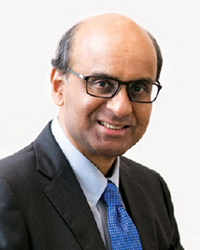
DPM Tharman Shanmugaratnam
Parliament of Singapore Deputy Prime Minister and Minister for Finance, Singapore
DPM Tharman Shanmugaratnam has served as Deputy Prime Minister in Singapore since 2011, and Minister for Finance since 2007. He leads the recently-formed SkillsFuture national initiative, which seeks to develop the skills of the future, and empower Singaporeans to learn throughout life.
Tharman was appointed by his international peers as Chairman of the IMFC, the policy steering committee of the IMF, for four years from March 2011 and was its first Asian chair. He is a member of the Group of Thirty, an independent council of leading economic policy-makers, finance leaders and academics.
He chairs the International Academic Advisory Panel that advises the Singapore government on strategies for the university sector. In addition, he chairs the International Advisory Council of the Singapore Economic Development Board.
He served for five years as Minister for Education, between 2003 and 2008. Much of his earlier professional life was spent at the Monetary Authority of Singapore (MAS), Singapore’s central bank and integrated financial regulator, where he was chief executive before entering politics in 2001.
Tharman studied economics at the London School of Economics and Cambridge University. He later took a masters in public administration at Harvard University, where he received the Lucius N. Littauer Fellow award for outstanding performance and leadership potential.
- 1
Speakers
-
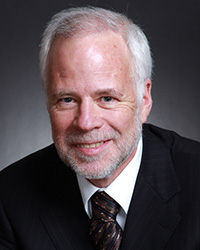
Professor Barry Eichengreen
University of California, Berkeley
George C. Pardee and Helen N. Pardee Professor of Economics and Political ScienceBarry Eichengreen is the George C. Pardee and Helen N. Pardee Professor of Economics and Professor of Political Science at the University of California, Berkeley, where he has taught since 1987. He is a Research Associate of the National Bureau of Economic Research (Cambridge, Massachusetts) and Research Fellow of the Centre for Economic Policy Research (London, England). In 1997-98 he was Senior Policy Advisor at the International Monetary Fund. He is a fellow of the American Academy of Arts and Sciences (class of 1997).
Professor Eichengreen is the convener of the Bellagio Group of academics and economic officials and chair of the Academic Advisory Committee of the Peterson Institute of International Economics. He has held Guggenheim and Fulbright Fellowships and has been a fellow of the Center for Advanced Study in the Behavioral Sciences (Palo Alto) and the Institute for Advanced Study (Berlin). He is a regular monthly columnist for Project Syndicate.
His books include Labor in the Era of Globalization, co-edited with Clair Brown and Michael Reich, Emerging Giants: China and India in the World Economy, co-edited with Poonam Gupta and Ranjiv Kumar, Fostering Monetary & Financial Cooperation in East Asia, co-edited with Duck-Koo Chung, What G20 Leaders Must Do to Stabilize Our Economy and Fix the Financial System, co-edited with Richard Baldwin, (e-book 2008), Rescuing Our Jobs and Savings: What G7/8 Leaders Can Do to Solve the Global Credit Crisis, co-edited with Richard Baldwin, (e-book 2008), Globalizing Capital: A History of the International Monetary System, Second Edition (2008), The European Economy since 1945: Coordinated Capitalism and Beyond (updated paperback edition) (2008), Bond Markets in Latin America: On the Verge of a Big Bang?, co-edited with Eduardo Borensztein, Kevin Cowan, and Ugo Panizza (2008), and China, Asia, and the New World Economy, co-edited with Charles Wyplosz and Yung Chul Park (2008).
He was awarded the Economic History Association's Jonathan R.T. Hughes Prize for Excellence in Teaching in 2002 and the University of California at Berkeley Social Science Division's Distinguished Teaching Award in 2004. He is also the recipient of a doctor honoris causa from the American University in Paris. -
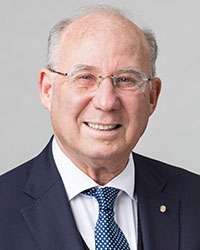
Dr. Jacob A. Frenkel
Chairman, JPMorgan Chase International
Jacob A. Frenkel is Chairman of JPMorgan Chase International and a member of the J.P. Morgan International Council. He also serves as Chairman of the Board of Trustees of the Group of Thirty (G-30) which is a private, nonprofit, Consultative Group on International Economic and Monetary Affairs.
Dr. Frenkel served from 2001 to 2011 as Chairman and CEO of the G-30, from 2004 to 2009 as Vice Chairman of American International Group, Inc., and from 2000 to 2004 as Chairman of Merrill Lynch International, as well as Chairman of Merrill Lynch’s Sovereign Advisory and Global Financial Institutions Groups. Between 1991 and 2000 he served two terms as the Governor of the Bank of Israel. He is credited with reducing inflation in Israel and achieving price stability, liberalizing Israel’s financial markets, removing foreign exchange controls, and integrating the Israeli economy into the global financial system.
Between 1987 and 1991, he was the Economic Counselor and Director of Research at the International Monetary Fund, and between 1973 and 1987 he was on the faculty of the University of Chicago where he held the position of the David Rockefeller Professor of International Economics and served as Editor of the Journal of Political Economy.
He is a Fellow of the Econometric Society, a Foreign Honorary Member of the American Academy of Arts and Sciences, a member of the Board of Trustees of the New York Economic Club, a member of the Board of Directors of the National Bureau of Economic Research, of the Japan Society, and of the Peterson Institute for International Economics, a member of the Trilateral Commission, a member of the Boards of the Aspen Institute Italia and The Council for the US and Italy, a member of Temasek International Panel (TIP), and a member of the International Advisory Council of China Development Bank. He is also a member of the Board of Directors of Boston Properties, Inc. and Loews Corporation.
Dr. Frenkel is a Laureate of the 2002 Israel Prize in Economics, a recipient of the Scopus Award from the Hebrew University, the Hugo Ramniceanu Prize for Economics from the Tel-Aviv University, the Czech Republic’s Karel Englis Prize in Economics, the “Order de Mayo al Merito” (in the rank of Gran Cruz) decoration from the Government of Argentina, the “Order of Merit” (in the rank of Cavaliere di Gran Croce) decoration from the Republic of Italy, and the YIVO Lifetime Achievement Award. He is also a recipient of several Honorary Doctoral degrees and other decorations and awards, including the “1993 Economic Policy Award” by “Emerging Markets” and the “1997 Central Banker of the Year Award” by “Euromoney”.
Dr. Frenkel serves as Chairman of the Board of Governors of Tel Aviv University. He previously served as Chairman of the Board of Governors of the Inter-American Development Bank (1995-1996), as Vice Chairman of the Board of Governors of the European Bank for Reconstruction and Development (1999-2000), as Governor of the IMF and Alternate Governor of the World Bank for Israel (1991-2000), and a member of the Economic Advisory Panel of the Federal Reserve Bank of New York (1986-2014).
Dr. Frenkel is the author of numerous books and articles in the fields of International Economics and Macro-Economics. Dr. Frenkel holds a B.A. in economics and political science from the Hebrew University of Jerusalem, and an M.A. and Ph.D. in economics from the University of Chicago. -
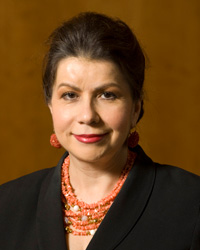
Professor Carmen M. Reinhart
John F. Kennedy School of Government Harvard University Minos A.
Zombanakis Professor of the International Financial SystemCarmen M. Reinhart is the Minos A. Zombanakis Professor of the International Financial System at Harvard Kennedy School. Previously, she was the Dennis Weatherstone Senior Fellow at the Peterson Institute for International Economics and Professor of Economics and Director of the Center for International Economics at the University of Maryland. Professor Reinhart held positions as Chief Economist and Vice President at the investment bank Bear Stearns in the 1980s.
She spent several years at the International Monetary Fund. Reinhart is a Research Associate at the National Bureau of Economic Research, and a member of the Congressional Budget Office Panel of Economic Advisers and the Economic Advisory Panel of the Federal Reserve Bank of New York. She has been listed among Bloomberg Markets Most Influential 50 in Finance.
Reinhart has written on a variety of topics in macroeconomics and international finance. She has served on numerous editorial boards and has testified before congress. Her work has helped to inform the understanding of financial crises for over a decade. Her best-selling book (with Kenneth S. Rogoff) entitled This Time is Different: Eight Centuries of Financial Folly documents the striking similarities of the recurring booms and busts that have characterized financial history and has been translated to over 20 languages and won the 2010 Paul A. Samuelson TIAA-CREF Institute Award, among others. -
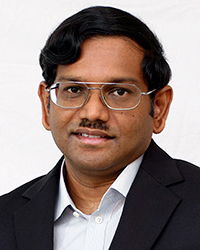
Mr Edward Robinson
Monetary Authority of Singapore
Assistant Managing Director and Chief EconomistEdward Surendran Robinson is the Assistant Managing Director of the Economic Policy Group, which is responsible for the formulation of Singapore's monetary policy. He has been with the MAS since 1992 and has been involved in macroeconometric modeling and is responsible for heading a team engaged in the continuing developmental work for the suite of MAS models, which are used for policy analysis.
He has also been involved in other areas of economic policy work including in various inter-agency work groups which looked at the structural challenges facing the Singapore economy. He served on the Board of the Singapore Competition Commission between 2005 and 2007. He studied economics and applied econometrics at Monash University and the University of Melbourne. -
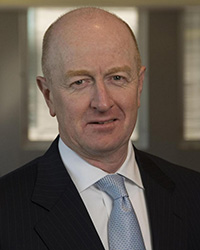
Mr Glenn Stevens
Reserve Bank of Australia
GovernorGlenn Stevens Governor of the Reserve Bank of Australia. Mr Stevens is a graduate of the University of Sydney, and the University of Western Ontario, Canada. He joined the Bank's Research Department in 1980, and held various senior positions in the 1990s, including heading the Economic Analysis and International Departments.
From 1996 to 2001, he was Assistant Governor (Economic), responsible for overseeing economic and policy advice to the Governor and Board of the RBA. He was appointed Deputy Governor, and member of the Board, of the RBA in December 2001. His appointment as Governor was effective 18 September 2006.
Mr Stevens is Chairman of the Reserve Bank Board and Payments System Board, and Chairman of the Council of Financial Regulators. He is one of two Australian representatives on the Financial Stability Board, an international body to promote financial stability. In the charitable sphere, Mr Stevens is Chairman of the Financial Markets Foundation for Children, and a Director of The Anika Foundation.
He has been a visiting scholar at the Federal Reserve Bank of San Francisco, and a member of the Advisory Boards of the Hong Kong Institute for Monetary Research, the Melbourne Institute of Applied Economic and Social Research at the University of Melbourne and the Australian School of Business at the University of New South Wales. In June 2014, Mr Stevens was awarded a Doctor of Laws, honoris causa (LLD) by Western University in Ontario, Canada. Mr Stevens is a signatory to The Banking and Finance Oath. -
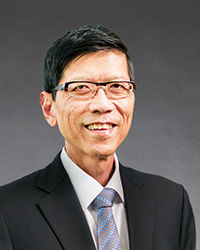
Professor Tan Chorh Chuan
National University of Singapore
PresidentTan Chorh Chuan was appointed President of the National University of Singapore in December 2008. He concurrently serves as the Chairman of the Board of the National University Health System. Prof Tan's additional appointments include Deputy Chairman of Singapore's Agency for Science, Technology and Research (A*STAR); Senior Advisor to the Governing Board of Duke-NUS Graduate Medical School; and Member, Board of Directors of the Monetary Authority of Singapore.
A renal physician, he obtained his medical training at NUS, and research training at the Institute of Molecular Medicine, Oxford. He was Dean of the NUS Faculty of Medicine from 1997 to 2000. He served as the Director of Medical Services, Ministry of Health, from 2000 to 2004, in which capacity he was responsible for leading the public health response to the 2003 SARS epidemic. He held the positions of NUS Provost, then Senior Deputy President from 2004 to 2008. He also played a key role in setting up the Duke-NUS Graduate Medical School, in his capacity as Deputy Chairman of the Governing Board from 2004 to 2007. As the inaugural Chief Executive of the National University Health System in 2008, he brought the NUS Medical and Dental Schools and the National University Hospital under single governance.
Prof Tan is a key leader in Singapore's Biomedical Sciences Initiative since its inception in 2000, for which he was awarded the National Science and Technology Medal in 2008. He also received the Public Service Star in 2003 for outstanding contributions to overcoming SARS in Singapore, and the Public Administration Gold Medal in 2004 for his work as Director of Medical Services in the Ministry of Health. Other awards include the Dr John Yu Medal from the George Institute for Global Health, Australia; the Albert Schweitzer Gold Medal from the Polish Academy of Medicine; Honorary Doctor of Medicine from King's College; Honorary Doctor of Science from Duke University; Honorary Doctor of Science from Loughborough University; Achievement Medal from the Singapore Society of Nephrology and the 1996 Singapore Youth Award.
Prof Tan, who has been a member of the World Economic Forum's Global University Leaders Forum (GULF) since 2008, was appointed Chair of GULF in 2014 for a two-year term. He also sits on the World Economic Forum's Science Advisory Committee. He was the Chairperson of the International Alliance of Research Universities, a consortium of 10 leading research-intensive universities from 2008 - 2012. Prof Tan was previously a Commonwealth Medical Fellow, Wellcome Fellow, University of Oxford, and a Visiting Scholar to Wolfson College, Oxford. He is a Fellow of the Royal College of Physicians of Edinburgh, Royal College of Physicians of London, the American College of Physicians, elected Fellow of the Polish Academy of Medicine and Fellow of the Royal Geographical Society, UK. -
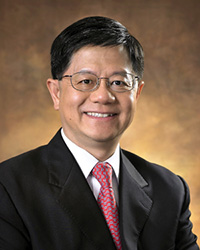
Professor Bernard Yeung
President, ABFER Executive Committee, National University of Singapore
Dean and Stephen Riady Distinguished Professor in Finance and Strategic ManagementBernard Yeung is the Dean and Stephen Riady Distinguished Professor in Finance and Strategic Management at National University of Singapore (NUS) Business School. Before joining NUS in June 2008, he was the Abraham Krasnoff Professor in Global Business, Economics, and Management at New York University (NYU) Stern School of Business. He has also served as the Director of the NYU China House, the honorary co-chair of the Strategy Department of the Peking University Guanghua School of Management, and Advisory Professor at the East China Normal University. From 1988 to 1999, he taught at the University of Michigan and at the University of Alberta from 1983 to 1988.
Professor Yeung`s research work has featured in more than 100 research publications covering topics in finance, strategy, foreign direct investment, international trade, international macroeconomics, institutional economics, sustainability, and economic history. His articles have appeared in journals in the fields of economics, finance, strategic management, international business, and accounting, as well as in top-tier media publications such as The Financial Times and The Wall Street Journal. He has contributed chapters in many leading books and written working papers.
He has also won several scholarly honours and awards for academic excellence, including the Irwin Outstanding Educator Award (2013) from the Business Policy and Strategy (BPS) division of the Academy of Management; the Excellence in Teaching Award (Executive Education) by Stern School of Business at NYU and Teacher Excellence Award (doctoral programmes) by University of Michigan Business School.
In addition, Professor Yeung has served on various committees and international advisory boards. He was a member of the Economic Strategies Committee in Singapore chaired by Mr Tharman Shanmugaratnam, Minister for Finance (2009). The committee was given the task of developing strategies for Singapore to build capabilities and maximise opportunities as a global city. Professor Yeung is also a member of several other committees, including the Management Advisory Committee of SPRING Singapore and the Financial Research Council of the Monetary Authority of Singapore.
Professor Yeung sits on the International Advisory Board of the Korea University Business School, the Intellectual Property of Singapore, the Institute of System Science Management Board, and the Strategic Recruitment Advisory Committee at NUS. He is the Dean Director on the Graduate Management Admission Council (GMAC) Board. He was also a member of the Maintenance of Accreditation Committee (MAC) and Asia Advisory Task force (AATF) of the Association to Advance Collegiate Schools of Business (AACSB). He is also an elected Fellow of the Academy of International Business (AIB).
Professor Yeung received his Bachelor of Arts in Economics and Mathematics from the University of Western Ontario and his MBA and PhD degrees from the Graduate School of Business at the University of Chicago. -

Dr Jahangir Aziz
JP Morgan Chase Head, Emerging Markets Asia Economic Research
Jahangir Aziz is the Head of EM Asia Economic Research at J.P. Morgan. He joined the firm in late 2008 as the India Chief Economist. Prior to joining J.P. Morgan, Jahangir was Principal Economic Advisor in India’s Ministry of Finance. He has also worked at the IMF, where he headed the China division from 2004 to 2007. He holds a PhD from University of Minnesota. He appears regularly in TV and print media and has been interviewed by CNBC, Bloomberg and BBC on India and ASEAN.
He writes opinion pieces for several Indian newspapers and business journals and is regularly quoted by the Financial Times and Wall Street Journal on India and Asia specific issues. Jahangir has also authored several academic research papers on China, India, the determinants of financial crisis, and real business cycles. He is the co-editor of "China and India Learning From Each Other: Reforms and Policies for Sustained Growth," IMF, Washington DC, 2007. He is also one of the few Asian economists to be invited by The Economist as a guest to debate global issues on the journal's online forum "Economics by Invitation." -
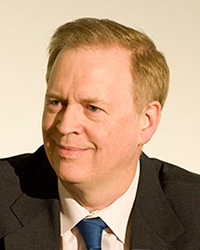
Professor Steven J. Davis
The University of Chicago Booth School of Business William H. Abbott
Professor of International Business and EconomicsSteven J. Davis is the William H. Abbott Professor of International Business and Economics at the University of Chicago Booth School of Business. He studies business dynamics, labor markets, economic fluctuations, and public policy. He is past editor of the American Economic Journal: Macroeconomics, elected fellow of the Society of Labor Economists, senior academic fellow with the Asian Bureau of Finance and Economics Research, research associate with the National Bureau of Economic Research, advisor to the U.S. Congressional Budget Office, and consultant to the Federal Reserve Bank of Atlanta.
Davis is known for his influential work using longitudinal data on firms and establishments to explore job creation and destruction dynamics and their relationship to economic performance. He is a co-creator of the Economic Policy Uncertainty Indices at www.PolicyUncertainty.com and the DHI Hiring Indicators at http://dhihiringindicators.com. He co-organizes the Asian Monetary Policy Forum, held annually in Singapore. In 2013, he received the Addington Prize in Measurement for his research on “Measuring Economic Policy Uncertainty.”
His teaching experience includes Ph.D. courses in macroeconomics and labor economics at the University of Chicago, the Massachusetts Institute of Technology, and the University of Maryland; MBA courses in macroeconomics, money and banking, business strategy, and financial institutions for Chicago Booth; and executive MBA courses in macroeconomics for Chicago Booth in Barcelona, London, and Singapore. Davis has also taught undergraduate courses in microeconomics, econometrics, and money and banking at Brown University and the Massachusetts Institute of Technology.
In addition to his scholarly work, Davis has written for the Atlantic, Bloomberg View, Financial Times, Forbes, Los Angeles Times, and the Wall Street Journal and appeared on Bloomberg TV, Channel News Asia, CNBC, CNN, Fox News, NBC Network News and the U.S. Public Broadcasting System. -
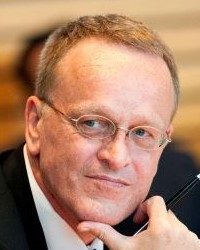
Mr Bert Hofman
World Bank Country Director, China, Mongolia and Korea, East Asia and Pacific
Bert Hofman a Dutch National, is the World Bank's Country Director for China, Mongolia and Korea in the East Asia and Pacific Region, based in Beijing. Prior to his present assignment, Mr. Hofman was the World Bank's Chief Economist for the East Asia and Pacific Region and Director, Singapore Office.
As regional chief economist he led a team to analyze key trends and policy issues across East Asia and the Pacific and as Director Singapore he helped build a partnership that focuses on expanding investment in infrastructure in emerging economies. Before moving to Singapore in 2011, Mr. Hofman was the Country Director for the Philippines, responsible for a growing portfolio of projects and advisory services to the Philippines government.
Mr. Hofman has accumulated more than 22 years of experience in the World Bank, 16 of which in the East Asia region. Among others, Mr. Hofman was Lead Economist for China and for Indonesia and country economist for Mongolia and Namibia. He had also worked on Brazil, South Africa, Mongolia, Zambia, and Namibia in his earlier years with the Bank. Prior to joining the World Bank, Mr. Hofman worked at the Kiel Institute of World Economics in Germany, the Organization for Economic Cooperation and Development (OECD) in Paris, and NMB Bank in the Netherlands (now ING). Mr. Hofman holds a degree in economics of Erasmus University Rotterdam and studied at the Christian Albrechts University, Kiel. -
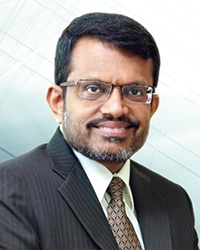
Mr Ravi Menon
Monetary Authority of Singapore, Managing Director
Ravi Menon was appointed Managing Director of the Monetary Authority of Singapore (MAS) in 2011. He was previously Permanent Secretary at the Ministry of Trade & Industry (MTI) and Deputy Secretary at the Ministry of Finance (MOF). Mr Menon began his career at MAS in 1987. During his 16 years in MAS, he was involved in monetary policy; econometric forecasting; organisational development; banking regulation and liberalisation; and integrated supervision of complex financial institutions.
Mr Menon spent a year at the Bank for International Settlements in Basel, as a member of the secretariat to the Financial Stability Forum. A recipient of the Public Administration Medal (Gold), Mr Menon has served on a variety of boards in the public, private, and people sectors in Singapore. On the international front, Mr Menon is a member of the Financial Stability Board Steering Committee and chairs the International Monetary and Financial Committee Deputies process. Mr Menon holds a Master in Public Administration from Harvard University and a Bachelor of Social Science (Honours) in Economics from the National University of Singapore. -

Professor Andrew K. Rose
B.T. Rocca Professor, Economic Analysis & Policy, University of California, Berkeley
Associate Dean and Faculty ChairAndrew K. Rose is the B.T. Rocca Jr. Professor of International Business in the Economic Analysis and Policy Group, Haas School of Business at the University of California, Berkeley. He is also a Research Associate of the National Bureau of Economic Research (based in Cambridge, MA), a Research Fellow of the Centre for Economic Policy Research (based in London, England), and a Senior Fellow of the Asian Bureau of Finance and Economic Research (based in Singapore). He received his Ph.D. from the Massachusetts Institute of Technology, his M.Phil. from Nuffield College, University of Oxford, and his B.A. from Trinity College, University of Toronto.
Rose has published over one hundred and fifty papers and over ninety articles in refereed economics journals, including the American Economic Review, the Quarterly Journal of Economics, the Review of Economic Studies, and the Journal of Finance. His research addresses issues in international trade, finance, and macroeconomics, and has received more than 40,000 citations. His teaching is in the areas of international macroeconomics; he has won two teaching awards.
Rose served as Associate Dean for Academic Affairs and Chair of the Faculty 2010-2016, and was the managing editor of The Journal of International Economics 1995-2001. He and the founding director of the Clausen Center for International Business and Policy at Haas and the Risk Management Institute at the National University of Singapore. He has organized over fifty academic conferences.
Rose is interested in the theory and practice of economic policy, and most of his work is applied and driven by "real world" international phenomena. A citizen of three countries, he has worked on six continents and at a number of international economic agencies, including: the International Monetary Fund, the World Bank, and the Asian Development Bank. He has also worked at a number of national agencies, including: the US Department of Treasury, HM Treasury (UK), the Canadian Department of Finance; and the central banks of: Australia, Canada, England, Europe, Hong Kong, Israel, Italy, Japan, Netherlands, New Zealand, Singapore, Spain, and the United States. He has visited a number of other universities, including Cape Town, EUI, FUB, INSEAD, London School of Economics, Melbourne, NUS, Princeton, SHUFE, SMU, Stockholm, Tel Aviv, Tsinghua, ULB, and Victoria. -
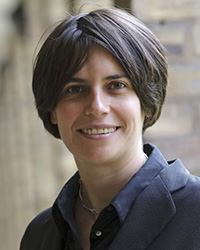
Prof Hélène Rey
London Business School, Professor of Economics
Hélène Rey was awarded an Alfred P. Sloan Research Fellowship (in 2005). She received the 2006 Bernácer Prize (Best European Economist Working in Macroeconomics and Finance under the Age of 40) for her important research on the determinants and consequences of external trade and financial imbalances: the theory of financial crisis and the internationalisation of currencies.
Professor Rey received the inaugural Birgit Grodal Prize of the European Economic Association, in 2012, and the Yrjö Jahnsson Prize, in 2013. She is on the Board of the Autorité de Contrôle Prudentiel, and a member of the Commission Economique de la Nation and the Bellagio Group on the International Economy.
Professor Rey is also on the Board of the Institute for New Economic Thinking (INET) and writes a regular column for the French newspaper, Les Echos. Prior to her role within the Economics department at London Business School, she was Professor of Economics and International Affairs at Princeton University, until 2007. -
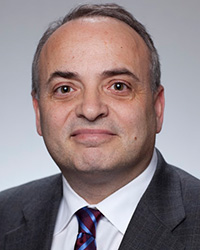
Dr Mark Spiegel
Federal Reserve Bank of San Francisco, Vice President International Research
Mark Spiegel is Vice President, International Research and Director of the Center for Pacific Basin Studies at the Federal Reserve Bank of San Francisco. Prior to joining the Federal Reserve, he served as an assistant professor in the Department of Economics at New York University. He has served as a visiting professor in the Economics Department of U.C. Berkeley,as well as a lecturer at the Haas School of Business at U.C. Berkeley.
He has also served as a consultant at the World Bank, as a visiting scholar at the Bank of Japan, and as Chairman of the Federal Reserve System Committee on International Economic Analysis. Dr. Spiegel received his Ph.D. in economics from the University of California at Los Angeles and his B.A. in economics from the University of California at Berkeley. Dr. Spiegel has published numerous articles in both academic and policy oriented journals on international financial issues and on economic issues associated with Asian economies. He is currently associate editor of the journal Japan and the World Economy. -
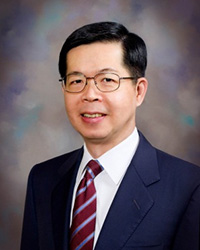
Dr Prasarn Trairatvorakul
Bank of Thailand, Governor
Prasarn Trairatvorakul has been appointed on October 1st, 2010 to be the 22nd Governor of the Bank of Thailand, the country’s Central Bank. Prior to this appointment, Dr. Prasarn has worked in the top positions of a number of public and private organizations, including the Securities and Exchange Commission of Thailand and Kasikornbank Pcl.
After graduated with a First-Class honours from the Faculty of Engineering, Chulalongkorn University in 1974, followed immediately by a Master’s Degree in Engineering at the Asian Institute of Technology (AIT), he won the Ananda Mahidol Scholarship to pursue his M.B.A. and Doctorate degree in Business Administration at Harvard University (1976-1981).
After a two-year stint as a research fellow at the International Food Policy Research Institute in Washington DC, he returned to Thailand to start his career at the Department of Economic Research, Bank of Thailand and later in the Department of Bank Supervision and Examination until 1992. Shortly thereafter, he became the Secretary-General at the Securities and Exchange Commission of Thailand, the sole agency responsible for capital market surveillance, regulation and capital market development.
In 2010, he was nominated and elected as Chairman of Thai Bankers' Association (TBA), gaining his extensive experiences in banking businesses and financial markets. Since 2014, Dr. Prasarn has been a member of the Board of Investment as well as a member of the State Enterprises Supervisory Board.
In September 2011 during the IMF and World Bank annual meetings, he was awarded the “2011 Emerging Markets Central Bank Governor of the Year Award for Asia". Later in December 2012, Money & Banking Magazine awarded him "2012 Financier of the Year Award". These awards recognize him for his strong policy track record and steadfast commitment to maintaining economic stability. -
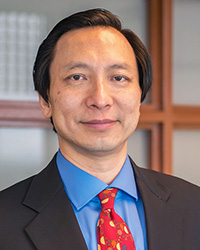
Dr Wei Shang-Jin
Asian Development Bank (ADB), Chief Economist
Wei Shang-Jin is the chief spokesperson for ADB on economic and development trends, and leads the Economic Research and Regional Cooperation Department, which publishes ADB's flagship knowledge products. Mr. Wei, born in the People's Republic of China and a national of the United States, has a long and distinguished career in academia and international finance and trade.
Before joining ADB he was the N.T. Wang Chair and Director of the Chazen Institute of International Business at Columbia University, Director of the National Bureau of Economic Research's working group on the Chinese economy, and a research fellow at the Center for Economic Policy Research (Europe).
Prior to Columbia University, Mr. Wei was an Assistant Director and Chief of Division at the International Monetary Fund (IMF) where he led the Fund's policy research and advised on issues in international trade, investment, globalization, and related topics. He was IMF Chief of Mission to Myanmar in 2004.
Mr. Wei served as an advisor on anti-corruption policy and research at the World Bank from 1999 to 2000. He was an assistant and associate professor at Harvard University from 1992 to 1999.
Mr. Wei earned a PhD in Economics and a Master's degree in Finance from the University of California, Berkeley; a Master's degree in Economics from Pennsylvania State University; and a Bachelor's degree in World Economy from Fudan University in the People's Republic of China.
- 1
Organizers


